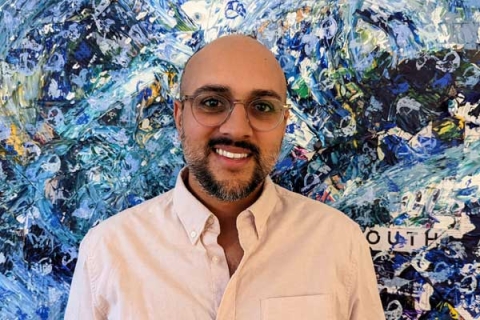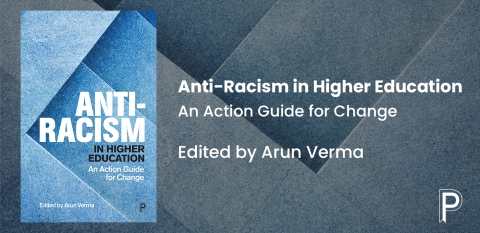

From uncertain beginnings, Psychology graduate Arun Verma's career has taken a path built around promoting inclusivity and supporting others, while remembering to be kind to himself too
7 min read
As we celebrate British Science Week 2023, we delve into the theme of connections and what it means to our alumni community. Dr Arun Verma, BSc (Hons) Psychology graduate, has taken the time to tell us his story. And for past or current students interested in pursuing a career in science, technology, engineering or maths (STEM), he shares some words of advice.
Arun finished his course in 2010 but knew he wasn’t ready to go straight into postgraduate study. After graduating, he started work in advertising and took some time to consider what to do next. His passion was research in psychology, ignited during his undergraduate degree, and the next step for an academic and research career was to return to university.
Now, he’s the Senior Manager of Diversity and Inclusion (Royal Academy of Engineering) and an Academic Tutor for University of Dundee. He is also a specialist consultant, where he works tirelessly as an ambassador for equality, social justice and intersectionality - an approach that allows everyone’s unique experiences of discrimination and inequality to be heard, acknowledged and acted upon. His work influences a range of individuals, organisations and sectors.
How did your time at Portsmouth sow the seeds for your future?
The psychology department at the University of Portsmouth was where I first encountered the possibility of a research career. At the end of my first year, my tutor invited me to help him as a research assistant, where I learnt about qualitative analysis software and research. Then, in my second year I was one of a few students granted the Nuffield Science Student Bursary where I supported research projects learning about facial action, emotion and advertising.
I am thankful to Portsmouth for providing me with the skills and space to innovate at the intersection of research and impact.
Arun Verma, BSc (Hons) Psychology, 2010
These opportunities helped me fall in love with research and how it can be used to understand social problems, injustices and inequality. What I didn’t realise at the time, I was engaging in advanced qualitative research methodologies in areas of conversation and discourse analysis which were way beyond what peers were learning. It was these qualitative skills which later helped me complete my doctoral research and led to my first academic publication. In fact, some of the chapters from my thesis were drawn from my undergraduate research assistantships.
I am thankful to Portsmouth for providing me with the skills and space to innovate at the intersection of research and impact. This has emboldened me to produce books, and deliver impactful keynotes and talks that help influence the conversation on social justice and inclusion, nationally and beyond.
Life after Portsmouth
After a year of working in advertising, I had the urge to get back to research – my passion was definitely for psychology and the social sciences. I applied for a Master's in Clinical Applications of Psychology at Kingston University, thinking that a career in Clinical Psychology would be for me. But shortly after being on the course, I realised this was not the route I wanted to take. Through conversations with the course director, I was allowed to pursue a research track in clinical psychology instead, where I supported everything from literature reviews to supporting eye-tracking research.
To actualise my goal of becoming a research leader, the next stage was to apply for a PhD programme. After several rejections, I landed on a fully-funded studentship to explore and create impact in an area I was passionate about, which was in the realm of qualitative research and tackling inequalities. I didn’t realise that decision would take me to Dundee, Scotland to complete a doctorate.
Looking back, I knew I wanted to sustain impact for communities and groups that were not always heard, seen or able to participate. However, I didn’t necessarily see myself leading the conversations on intersectionality, anti-racism, and inclusion at the scale I am now, mostly because I never knew those career paths existed.
My career now
After my doctorate, I secured a Lectureship at the University. Whilst I had been working towards an academic and research career, I realised I wanted to take my skills and expertise into the field and know what it means to put all my academic expertise into the world. My first job after finishing my PhD was within local government commissioning where I integrated an inclusive, intersectional, and anti-racist redesign of mental health and domestic abuse systems.
I then went on to work with Save the Children UK as part of the UK Impact team tackling child poverty in the UK. Here I developed intersectional and inclusive evidence, learning activities and programmes to address the issues faced by children living in poverty across the UK. During my time here, I had the opportunity to work on Global Programmes, which extended my knowledge and practice to an international reach.
It was through these experiences I was channelling my passion for bridging the gap between knowledge creation, practice and impact. I got to see first-hand how creating knowledge led to programmes and practices to better meet the needs of people in poverty and facing marginalisation; being part of that is something I am really proud of.

Publishing my book
At the age of 33, I successfully published my first edited collection ‘Anti-Racism in Higher Education: An Action Guide for Change’. The idea was born out of collective experiences of racial harassment in higher education myself and peers went through. What was meant to be an open letter to various governing bodies turned out to be something much bigger and more important.
It started with two virtual events and well over a hundred people attended each session. We had just over 20 contributing authors who conducted rapid literature reviews, shared the most personal stories, and dictated things that needed to change. The book was also curated to create reflective practice and poses poignant reflective questions to the reader.
Six months after the book was developed and without funding, publishers or resources, I approached the Policy Press and pitched the book. They immediately said yes. Then came lots of editing and hard labour of dealing with contracting, organising authors, and re-writing to ensure there was a clear voice throughout. The edited collection was completed in two years, which is highly unusual for something like this.
We launched the book in June 2022 and the response has been incredible. Organisations across the world have engaged and informed me they are using it to help lever change for staff equality networks. We’ve also had inclusion practitioners using it to guide their practice too. I’m continuously amazed by the response and how organisations and individuals utilise the book. I’m excited to continue collaborating and connecting with those using the book to achieve impact.
Where I am now
The book coincided with my appointment as the Head of the Race Equality Charter with Advance HE. Here I worked on making vast improvements to the charter led by outcomes and impact, and I am pleased to see the improvements we made are still keeping on.
My work now is focused on bringing to life the utility of intersectionality to achieving transformational change and inclusion across a sector that is so integral to UK life and society. My days are packed. I have a full-time job and do my influencing work as part of and around that. The days might be long but I am often invited to provide strategic advice, guidance and strategy on inclusion to a range of senior leaders nationally and further afield.
My main remit is to embolden the UK to have more sophisticated conversations about inclusion and intersectionality. I continue to provide strategic advice, influence, and leadership to inspire and provide confidence to communities; this in turn recognises that no one person experiences one inequality at a time.
The mode of my work is varied, but the message I share is always about intersectionality, inclusion and impact. The other part of my daily life is really about taking care of myself and being kind to myself, which I do struggle with, and is a daily practice. I think careers in research and science can mean we neglect our wellbeing, and this is a journey I continue to be on.
My foundational knowledge was gained from University of Portsmouth, my approach to this coming from a social psychology background has been hugely instrumental in the way I make sense of and do the work I do for inclusion.
One of my favourite parts of the job is when I deliver a keynote or facilitate a workshop and I see the shift in people’s language and facial expressions when they make sense of intersectionality and the role that plays in inclusion. I see their faces change, whether it be online or in person, and the ‘a-ha’ moment that happens. Knowing that I have helped just one person to actualise a concept that felt so foreign to them, and seeing that change happen, is truly amazing. It’s also helped by the research assistantship I did during my undergraduate on facial action and emotion to see that shift.
Invite yourself to opportunities and be open to going out of your comfort zone to learn more about yourself, your ambitions and your success for the future. Ensure you can find joy in whatever you decide to do.
Arun Verma, Senior Manager, Royal Academy of Engineering & Academic Tutor, University of Dundee
British Science Week and the impact connections have on my work
The theme of ‘connections’ really resonates with me and the work I do for diversity and inclusion. The base of my work is to build connections amongst different groups and systems to facilitate a conversation about what intersectionality and inclusion mean for us as a society.
Without these connections, we are less creative, we lack innovation and we stagnate our learning, and I think connectivity is so important right now to tackle some of our pressing issues. I’m interested in creating spaces where we connect on a platform that can help us tackle some of the most pressing injustices that people continue to face.
I think one of the things that have been so important for me is not disconnecting professional practice from my wellbeing. Being involved and leading inclusion work across the UK can take its toll and I think that the relationship between wellbeing and inclusion requires investment and time. Without good wellbeing, we can’t invest in our connections with people and organisations, so I think self-care is really important to connect with.
My advice to graduates and students interested in a STEM career would be this: invite yourself to opportunities and be open to going out of your comfort zone to learn more about yourself, your ambitions and your success for the future. Ensure you can find joy in whatever you decide to do.
When I left University of Portsmouth, I was clueless and naïve, and I went straight into work which was great but I didn’t have that joy. There was something in my gut telling me there was something more I had to give, and that joy was in psychology and research. I’m so glad I listened to that instinct because I wouldn’t have achieved or had the impact I am having without that.
